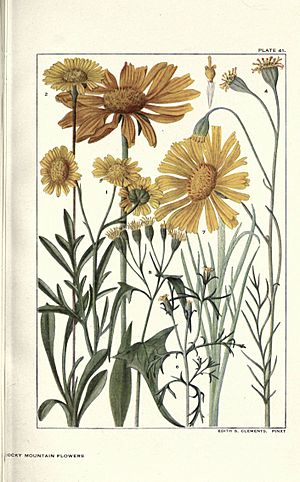Mountain tail-leaf facts for kids
Quick facts for kids Mountain tail-leaf |
|
|---|---|
 |
|
| Fig. nº 5 | |
| Scientific classification | |
| Kingdom: | |
| (unranked): | |
| (unranked): | |
| (unranked): | |
| Order: | |
| Family: | |
| Tribe: |
Perityleae
|
| Genus: |
Pericome
|
| Species: |
P. caudata
|
| Binomial name | |
| Pericome caudata |
|
Pericome caudata is a type of flowering plant. It is often called the mountain tail-leaf. This plant belongs to the aster family, which includes sunflowers and daisies.
You can find the mountain tail-leaf in the southwestern United States. It grows as far east as Colorado, Oklahoma, and Texas. It also grows in northern Mexico. This plant likes rocky places, especially in hills and mountains. Sometimes, it even grows in areas where the ground has been disturbed.
Contents
Discovering Mountain Tail-Leaf
The mountain tail-leaf is a large plant. It can grow up to 2 meters (about 6.5 feet) tall. It is a perennial herb or a subshrub. This means it lives for many years. It also has a woody base, like a small bush.
What Does It Look Like?
This plant has many branches and lots of leaves. It feels a bit sticky and has a strong smell. This is because it has special glands that produce resin.
Its leaves are usually shaped like a triangle. They can be up to 12 centimeters (about 5 inches) long. Sometimes, the leaves have a few large teeth or sharp points. Each leaf grows on a small stem called a petiole. The size and shape of the leaves can be different depending on where the plant grows.
Its Golden Flowers
The mountain tail-leaf produces many small flower heads. These flower heads grow in a cluster. Each one is less than a centimeter wide. They are full of tiny, golden yellow flowers called disc florets. These flowers make the plant look bright and cheerful.
The Navajo people have a long history with the mountain tail-leaf. They used this plant for many different purposes.
Medicinal and Ceremonial Uses
The Navajo used the plant in traditional healing practices. They also used it in special ceremonies. These uses show how important plants were to their culture and daily life.

